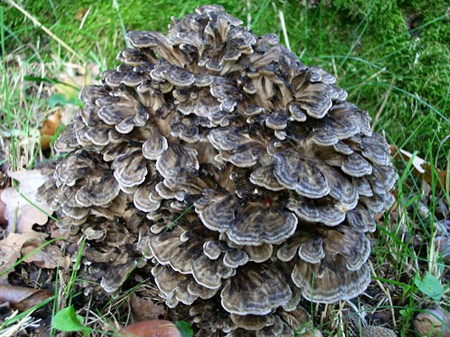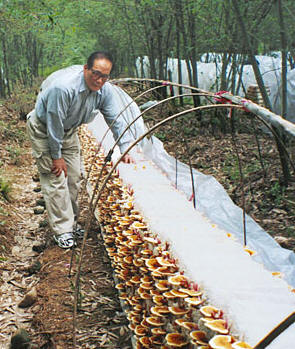
Lateinischer Name: Grifola frondosa
Andere Namen: maitake, Hen-of-the-Woods, Ram's head, Sheep's head (englisch), Klapperschwamm, Laubporling, Maitake (deutsch), Grifola frondosa (französisch).
Aktive Inhaltsstoffe: Polysaccharide (Beta-1,3- und -1,6-Glucane), Heteroglycane, Lipid-Sterole und Sterylglycoside (Ergosterol = Vitamin D2, Fungisterin), Vanadium, Kalium, Calcium, Magnesium, Vitamin B2, Aminosäuren.
Der Maitake ist ein Pilz, der aus Japan und Nordamerika stammt. In Japan gilt der Maitake als Delikatesse und wird in vielen Gerichten verwendet. Das japanische mai-take bedeutet wörtlich “tanzender Pilz”. Es geht die Legende, dass die mittelalterlichen Japaner so glücklich waren, als sie diesen Pilz fanden, dass sie anfingen, zu tanzen, da der Pilz mit Silber aufgewogen wurde (!). Eine andere Geschichte besagt, dass der Name von der Wuchsweise des Pilzes stammt, da die übereinander wachsenden Pilze mit etwas Phantasie an tanzende Schmetterlinge erinnern.
In der chinesischen und japanischen Medizin wird der Maitake schon seit vielen Jahrhunderten verwendet. Wie bei vielen medizinischen Pilzen stehen auch hier die immunstärkenden Eigenschaften im Vordergrund (Ref. 33, 34, 35, 39). Daneben ist der Maitake reich an Vanadium, Kalium, Calcium, Magnesium, Vitamin B2, Vitamin D, Aminosäuren und Beta-Glucanen (Ref. 39, 40, 41). Auch zur Senkung des Cholesterinspiegels wird der Pilz verwendet (Ref. 1 – 5, 32). Die Wissenschaftler nehmen an, dass die Wirkung des Maitake auf das Immunsystems vor allem auf der Aktivierung verschiedener Zellarten wie Makrophagen, natürlicher Killerzellen und T-Zellen, sowie auch von Interleukin-1 und Superoxidanionen beruht (Ref. 23, 42, 43, 44).
Seit Jahrzehnten werden im Westen die medizinischen Eigenschaften von Pilzarten, u.a. des Maitake, untersucht. Angeregt wurde dies durch die Tatsache, dass Pilze in der chinesischen und japanischen Medizin schon seit Jahrtausenden bei verschiedenen Krankheiten, darunter auch Krebs, eingesetzt werden. In Japan und China gibt es registrierte Arzneimittel, die auf Pilzen bzw. Pilzextrakten basieren. Leider liegt viel Forschungsmaterial bisher noch unübersetzt nur auf Chinesisch und Japanisch vor. Die westliche Medizin hat jedoch großes Interesse an den Anwendungen des Fernen Ostens, und verschiedene Studien zeigen, dass Substanzen aus Pilzen wie dem Maitake zum Beispiel gut in einer kombinierten Chemotherapie eingesetzt werden können. Die immunstärkenden Eigenschaften sorgen dafür, dass auch die Chemotherapie leichter zu ertragen ist.
Anwendungen des Maitake in der TCM (Traditionelle Chinesische Medizin)
| Name in der TCM | Huishuhua, Keisho (chinesisch) |
| Geschmack | süß |
| Wirkung | Lunge, Niere, Darm |
| Anwendung | Neutral |
Wissenschaftliche Studien
| Gebiet | Studie |
| Immunsystem | 32,33,34,35 |
| Antiviral | 36 |
| Anti-Tumor / Krebs | 9,10,11,12,13,14,15,16,17,18,19,20,21,22,23,24,25,26,27,28,29,30,31 |
| Blutzuckerspiegel | 28 |
| Blutdruck | 1,2,3 |
| Cholesterin | 1,2,3,4,5,28,32,41 |
| Entzündungshemmer | 7 |
| Antikoagulantien | |
| Diabetes | |
| Leberschutz | |
| Allergie | |
| Lungenkrankheiten | |
| Hautprobleme | |
| Ausdauer |
Wissenschaftliche Forschung zum Maitake – 44 verfügbare Referenzen
- Kabir Y, Yamaguchi M, Kimura S. Effect of shiitake (Lentinus edodes) and maitake (Grifola frondosa) mushrooms on blood pressure and plasma lipids of spontaneously hypertensive rats. J Nutr Sci Vitaminol (Tokyo). 1987 Oct;33(5):341-6. PMID: 3443885
- Kabir Y, Kimura S. Dietary mushrooms reduce blood pressure in spontaneously hypertensive rats (SHR). J Nutr Sci Vitaminol (Tokyo). 1989 Feb;35(1):91-4. PMID: 2738717
- Fukushima M, Ohashi T, Fujiwara Y, Sonoyama K, Nakano M. Cholesterol-lowering effects of maitake (Grifola frondosa) fiber, shiitake (Lentinus edodes) fiber, and enokitake (Flammulina velutipes) fiber in rats. Exp Biol Med (Maywood). 2001 Sep;226(8):758-65. PMID: 11520942
- Rop O, Mlcek J, Jurikova T. Beta-glucans in higher fungi and their health effects. Nutr Rev. 2009 Nov;67(11):624-31. PMID: 19906249
- Driscoll M, Hansen R, Ding C, Cramer DE, Yan J. Therapeutic potential of various beta-glucan sources in conjunction with anti-tumor monoclonal antibody in cancer therapy. Cancer Biol Ther. 2009 Feb;8(3):218-25. Epub 2009 Feb 3. PMID: 19106638
- Vetvicka V, Vashishta A, Saraswat-Ohri S, Vetvickova J. Immunological effects of yeast- and mushroom-derived beta-glucans. J Med Food. 2008 Dec;11(4):615-22. PMID: 19053851
- Yu S, Weaver V, Martin K, Cantorna MT. The effects of whole mushrooms during inflammation. BMC Immunol. 2009 Feb 20;10:12. PMID: 19232107
- Chang R. Functional properties of edible mushrooms. Nutr Rev. 1996 Nov;54(11 Pt 2):S91-3. PMID: 9110582
- Jiang J, Sliva D. Novel medicinal mushroom blend suppresses growth and invasiveness of human breast cancer cells. Int J Oncol. 2010 Dec;37(6):1529-36. PMID: 21042722
- Martin KR, Brophy SK. Commonly consumed and specialty dietary mushrooms reduce cellular proliferation in MCF-7 human breast cancer cells. Exp Biol Med (Maywood). 2010 Nov 1;235(11):1306-14. Epub 2010 Oct 4.PMID: 20921274
- Han SS, Cho CK, Lee YW, Yoo HS. Antimetastatic and immunomodulating effect of water extracts from various mushrooms. J Acupunct Meridian Stud. 2009 Sep;2(3):218-27. PMID: 20633495
- Masuda Y, Ito K, Konishi M, Nanba H. A polysaccharide extracted from Grifola frondosa enhances the anti-tumor activity of bone marrow-derived dendritic cell-based immunotherapy against murine colon cancer. Cancer Immunol Immunother. 2010 Oct;59(10):1531-41. Epub 2010 Jun 20. PMID: 20563803
- Kodama N, Mizuno S, Nanba H, Saito N. Potential antitumor activity of a low-molecular-weight protein fraction from Grifola frondosa through enhancement of cytokine production. J Med Food. 2010 Feb;13(1):20-30. PMID: 20136432
- Masuda Y, Matsumoto A, Toida T, Oikawa T, Ito K, Nanba H. Characterization and antitumor effect of a novel polysaccharide from Grifola frondosa. J Agric Food Chem. 2009 Nov 11;57(21):10143-9. PMID: 19839588
- Louie B, Rajamahanty S, Won J, Choudhury M, Konno S. Synergistic potentiation of interferon activity with maitake mushroom d-fraction on bladder cancer cells. BJU Int. 2010 Apr;105(7):1011-5. Epub 2009 Sep 4. PMID: 19735256
- Shomori K, Yamamoto M, Arifuku I, Teramachi K, Ito H. Antitumor effects of a water-soluble extract from Maitake (Grifola frondosa) on human gastric cancer cell lines. Oncol Rep. 2009 Sep;22(3):615-20. PMID: 19639212
- Ito K, Masuda Y, Yamasaki Y, Yokota Y, Nanba H. Maitake beta-glucan enhances granulopoiesis and mobilization of granulocytes by increasing G-CSF production and modulating CXCR4/SDF-1 expression. Int Immunopharmacol. 2009 Sep;9(10):1189-96. Epub 2009 Jun 30. PMID: 19573626
- Deng G, Lin H, Seidman A, Fornier M, D'Andrea G, Wesa K, Yeung S, Cunningham-Rundles S, Vickers AJ, Cassileth B. A phase I/II trial of a polysaccharide extract from Grifola frondosa (Maitake mushroom) in breast cancer patients: immunological effects. J Cancer Res Clin Oncol. 2009 Sep;135(9):1215-21. Epub 2009 Mar 1.PMID: 19253021
- Masuda Y, Inoue M, Miyata A, Mizuno S, Nanba H. Maitake beta-glucan enhances therapeutic effect and reduces myelosupression and nephrotoxicity of cisplatin in mice. Int Immunopharmacol. 2009 May;9(5):620-6. Epub 2009 Feb 26. PMID: 19249389
- Konno S. Synergistic potentiation of D-fraction with vitamin C as possible alternative approach for cancer therapy. Int J Gen Med. 2009 Jul 30;2:91-108. PMID: 20360893
- Rajamahanty S, Louie B, O'Neill C, Choudhury M, Konno S. Possible disease remission in patient with invasive bladder cancer with D-fraction regimen. Int J Gen Med. 2009 Jul 30;2:15-7. PMID: 20360882
- Pyo P, Louie B, Rajamahanty S, Choudhury M, Konno S. Possible immunotherapeutic potentiation with D-fraction in prostate cancer cells. J Hematol Oncol. 2008 Dec 4;1:25. PMID: 19055833
- Masuda Y, Murata Y, Hayashi M, Nanba H. Inhibitory effect of MD-Fraction on tumor metastasis: involvement of NK cell activation and suppression of intercellular adhesion molecule (ICAM)-1 expression in lung vascular endothelial cells. Biol Pharm Bull. 2008 Jun;31(6):1104-8. PMID: 18520039
- Konno S. Effect of various natural products on growth of bladder cancer cells: two promising mushroom extracts. Altern Med Rev. 2007 Mar;12(1):63-8.
- Kodama N, Murata Y, Asakawa A, Inui A, Hayashi M, Sakai N, Nanba H. Maitake D-Fraction enhances antitumor effects and reduces immunosuppression by mitomycin-C in tumor-bearing mice. Nutrition. 2005 May;21(5):624-9. PMID: 15850970
- Kodama N, Komuta K, Nanba H. Effect of Maitake (Grifola frondosa) D-Fraction on the activation of NK cells in cancer patients. J Med Food. 2003 Winter;6(4):371-7. PMID: 14977447
- Lin H, She YH, Cassileth BR, Sirotnak F, Cunningham Rundles S. Maitake beta-glucan MD-fraction enhances bone marrow colony formation and reduces doxorubicin toxicity in vitro. Int Immunopharmacol. 2004 Jan;4(1):91-9. PMID: 14975363
- Li X, Rong J, Wu M, Zeng X. [Anti-tumor effect of polysaccharide from Grifola frondosa and its influence on immunological function] Zhong Yao Cai. 2003 Jan;26(1):31-2. PMID: 12858772
- Kodama N, Komuta K, Sakai N, Nanba H. Effects of D-Fraction, a polysaccharide from Grifola frondosa on tumor growth involve activation of NK cells. Biol Pharm Bull. 2002 Dec;25(12):1647-50. PMID: 12499658
- Finkelstein MP, Aynehchi S, Samadi AA, Drinis S, Choudhury MS, Tazaki H, Konno S. Chemosensitization of carmustine with maitake beta-glucan on androgen-independent prostatic cancer cells: involvement of glyoxalase I. J Altern Complement Med. 2002 Oct;8(5):573-80. PMID: 12470438
- Yang D, Li S, Wang H, Li X, Liu S, Han W, Hao J, Zhang H. [Prevention of postoperative recurrence of bladder cancer: a clinical study] Zhonghua Wai Ke Za Zhi. 1999 Aug;37(8):464-5. PMID: 11829890
- Mayell M. Maitake extracts and their therapeutic potential. Altern Med Rev. 2001 Feb;6(1):48-60. PMID: 11207456
- Ragupathi G, Yeung KS, Leung PC, Lee M, Lau CB, Vickers A, Hood C, Deng G, Cheung NK, Cassileth B, Livingston P. Evaluation of widely consumed botanicals as immunological adjuvants. Vaccine. 2008 Sep 2;26(37):4860-5. Epub 2008 Jul 18. PMID: 18640165
- Wu MJ, Cheng TL, Cheng SY, Lian TW, Wang L, Chiou SY. Immunomodulatory properties of Grifola frondosa in submerged culture. J Agric Food Chem. 2006 Apr 19;54(8):2906-14. PMID: 16608207
- Kodama N, Murata Y, Nanba H. Administration of a polysaccharide from Grifola frondosa stimulates immune function of normal mice. J Med Food. 2004 Summer;7(2):141-5. PMID: 15298759
- Kodama N, Yamada M, Nanba H. Addition of Maitake D-fraction reduces the effective dosage of vancomycin for the treatment of Listeria-infected mice. Jpn J Pharmacol. 2001 Dec;87(4):327-32. PMID: 11829152
- Chen JT, Tominaga K, Sato Y, Anzai H, Matsuoka R. Maitake Mushroom (Grifola frondosa) Extract Induces Ovulation in Patients with Polycystic Ovary Syndrome: A Possible Monotherapy and a Combination Therapy After Failure with First-Line Clomiphene Citrate. J Altern Complement Med. 2010 Oct 29. [Epub ahead of print]PMID: 21034160
- Preuss HG, Echard B, Bagchi D, Perricone NV. Maitake mushroom extracts ameliorate progressive hypertension and other chronic metabolic perturbations in aging female rats. Int J Med Sci. 2010 Jun 7;7(4):169-80. PMID: 20567593
- Lindequist U, Rausch R, Füssel A, Hanssen HP. [Higher fungi in traditional and modern medicine] Med Monatsschr Pharm. 2010 Feb;33(2):40-8. PMID: 20184262
- Figlas D, Oddera M, Curvetto N. Bioaccumulation and bioavailability of copper and zinc on mineral-enriched mycelium of Grifola frondosa. J Med Food. 2010 Apr;13(2):469-75. PMID: 20132038
- Cui B, Han L, Qu J, Lv Y. Hypoglycemic activity of Grifola frondosa rich in vanadium. Biol Trace Elem Res. 2009 Nov;131(2):186-91. Epub 2009 Mar 13. PMID: 19283341
- Adachi K, Nanba H, Kuroda H. Potentiation of host-mediated antitumor activity in mice by beta glucan obtained from Grifola frondosa (maitake). Chem Pharm Bull 1987;35:262-70.
- Kubo K, Aoki H. Nanba H. Anti-diabetic activity present in the fruit body of Grifola frondosa (Maitake). Biol Pharm Bull 1994;17:1106-10.
- Horio H, Ohtsuru M. Maitake (Grifola frondosa) improve glucose tolerance of experimental diabetic rats. J Nutr Sci Vitaminol 2001;47:57-63.




